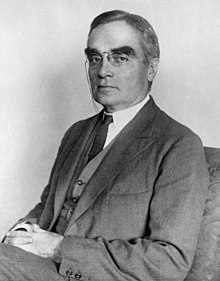
Back ليرند هاند Arabic ليرند هاند ARZ لیرند هاند AZB Лърнид Хенд Bulgarian Learned Hand Czech Learned Hand German Learned Hand Spanish Learned Hand French לרנד הנד HE 러니드 핸드 Korean
Learned Hand | |
|---|---|
 Portrait, c. 1910 | |
| Senior Judge of the United States Court of Appeals for the Second Circuit | |
| In office June 1, 1951 – August 18, 1961 | |
| Chief Judge of the United States Court of Appeals for the Second Circuit | |
| In office September 1, 1948 – June 1, 1951 | |
| Preceded by | Office established |
| Succeeded by | Thomas Walter Swan |
| Judge of the United States Court of Appeals for the Second Circuit | |
| In office December 20, 1924 – June 1, 1951 | |
| Appointed by | Calvin Coolidge |
| Preceded by | Julius Marshuetz Mayer |
| Succeeded by | Harold Medina |
| Judge of the United States District Court for the Southern District of New York | |
| In office April 26, 1909 – December 29, 1924 | |
| Appointed by | William Howard Taft |
| Preceded by | Seat established by 35 Stat. 685 |
| Succeeded by | Thomas D. Thacher |
| Personal details | |
| Born | Billings Learned Hand January 27, 1872 Albany, New York, U.S. |
| Died | August 18, 1961 (aged 89) New York City, U.S. |
| Political party |
|
| Spouse |
Frances Amelia Fincke
(m. 1902) |
| Children | 3 |
| Parent |
|
| Relatives |
|
| Education | Harvard University (AB, AM, LLB) |
Billings Learned Hand (/ˈlɜːrnɪd/ LURN-id; January 27, 1872 – August 18, 1961) was an American jurist, lawyer, and judicial philosopher. He served as a federal trial judge on the U.S. District Court for the Southern District of New York from 1909 to 1924 and as a federal appellate judge on the U.S. Court of Appeals for the Second Circuit from 1924 to 1961.
Born and raised in Albany, New York, Hand majored in philosophy at Harvard College and graduated with honors from Harvard Law School. After a relatively undistinguished career as a lawyer in Albany and New York City, he was appointed at the age of 37 as a Manhattan federal district judge in 1909. The profession suited his detached and open-minded temperament, and his decisions soon won him a reputation for craftsmanship and authority. Between 1909 and 1914, under the influence of Herbert Croly's social theories, Hand supported New Nationalism. He ran unsuccessfully as the Progressive Party's candidate for chief judge of the New York Court of Appeals in 1913, but withdrew from active politics shortly afterwards. In 1924, President Calvin Coolidge elevated Hand to the Court of Appeals for the Second Circuit, which he went on to lead as the senior circuit judge (later retitled chief judge) from 1939 until his semi-retirement in 1951. Scholars have recognized the Second Circuit under Hand as one of the finest appeals courts in American history. Friends and admirers often lobbied for Hand's promotion to the Supreme Court, but circumstances and his political past conspired against his appointment.
Hand possessed a gift for the English language, and his writings are admired as legal literature.[1] He rose to fame outside the legal profession in 1944 during World War II after giving a short address in Central Park that struck a popular chord in its appeal for tolerance. During a period when a hysterical fear of subversion divided the nation, Hand was viewed as a liberal defender of civil liberties. A collection of Hand's papers and addresses, published in 1952 as The Spirit of Liberty, sold well and won him new admirers. Even after he criticized the civil-rights activism of the Warren Court, Hand retained his popularity.
Hand is also remembered as a pioneer of modern approaches to statutory interpretation. His decisions in specialist fields—such as patents, torts, admiralty law, and antitrust law—set lasting standards for craftsmanship and clarity. On constitutional matters, he was both a political progressive and an advocate of judicial restraint. He believed in the protection of free speech and in bold legislation to address social and economic problems. He argued that the United States Constitution does not empower courts to overrule the legislation of elected bodies, except in extreme circumstances. Instead, he advocated the "combination of toleration and imagination that to me is the epitome of all good government".[2] As of 2004,[update] Hand had been quoted more often by legal scholars and by the Supreme Court of the United States than any other lower-court judge.[3]
- ^ Schick 1970, pp. 188–89
- ^ Dworkin 1996, p. 342. Quoted from Hand's 1958 Holmes Lectures.
- ^ Stone 2004, p. 200; Vile 2003, p. 319